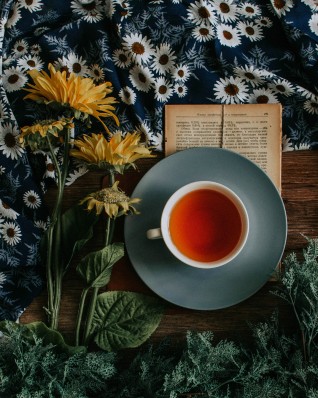
“A Nice Cup of Tea” is an essay written by him upon the art of making the perfect cup of tea wherein he lists his own eleven “golden” rules which he believes if followed, would result in an excellent cup of tea. The essay was first published on 12 January, 1946 in the London Evening Standard and contains an in-depth discussion on the subtleties involved in the craft of tea-making.
A Nice Cup Of Tea | Summary and Analysis
Orwell believes that tea is “one of the mainstays of civilisation” not only in England but also in Eire, Australia and New Zealand and thus, he finds it weird that none of the cookery books has any mention of this very important beverage. Even if one manages to find a recipe in some cookbook, it is very sketchy and fails to highlight the points to be kept in mind in order to brew the perfect cup of tea.
In fact, the best manner of making tea is a much-disputed topic across the world, with everyone believing their methods to be superior. Orwell himself being an ardent tea-lover, has his own recipe for making tea in which he says, are eleven points which must be kept in mind so as to make tea as it ought to be made, with its taste being absolutely perfect. He enlists these “golden” rules, citing his logic and reasons behind each one of them, and concludes that only if one follows these rules, shall one be able to fully enjoy one’s tea. He also says that while some of his steps might be very controversial, there are also some which are generally agreed upon by people across the world.
Firstly, he says, one should only use Indian or Ceylonese as it provides for the best simulation, unlike China tea which though is cheaper and can be had without milk, fails to do so. The comfort provided by Indian tea is unparalleled.
The next thing to be kept in mind is to always make tea in a teapot, in small quantities as when it is made in large quantities such as in an urn or a cauldron-like in the army- it loses its taste. Also, the best teapot for making tea is one made of china or earthenware. Even pewter teapots do a fairly good job, but Britannia and enamel teapots are not at all recommended by Orwell as they produce very inferior tea.
Also, he says that before making tea, one should warm up the teapot and that too by placing it on the burner and not by pouring hot water over it.
Fourthly, one should not be shy when adding tea as a good tea is one that is strong. The exact measurements to be followed for getting just the right flavour is to add six teaspoons of tea to a pot holding nearly a quart of water. The idea, however, is not suitable at a time when food supplies are being rationed by the government, as was the case when this essay was written. Using such large quantities of tea every day was something that most people could not manage to do and hence, Orwell recommends that instead of having tea all days of the week, one should work according to their ration. But, he does state that as per his opinion, one strong cup of tea, even if not received as many times, is much better than twenty weak one and that all tea lovers only prefer strong tea. In fact, they want it to get a little more stronger as each year passes which is probably why an extra ration is issued to the aged pensioners.
Next, he says that the tea should be directly put into the pot without any strainers, muslin bags or any other devices meant for catching the tea leaves as they pose a hindrance in its proper infusion. Also, when one is pouring water into the teapot, it should be boiling and therefore it is advisable to take the kettle to the teapot instead of the other way round. Once the tea is made, one should stir it, giving the pot a good shake and let the tea leaves settle before pouring it.
After this, Orwell talks about the optimal cup for drinking tea and says that the cylindrical cup is much better suited for tea than the flat, shallow ones as not only does the former hold more tea, the latter also makes the tea go cold very soon. He also suggests that the milk used for tea should not have any cream as milk that is too creamy makes the tea very off-putting.
The tenth point given by Orwell is the one which is most controversial so much so that in every family in Britain, people are divided into two factions as regards this point. While one school of thought believes that milk should be poured first into the cup and then tea should be added to it, the other one thinks that tea should be poured first and subsequently, milk should be added. The author himself stands with the tea-first group because he thinks that adding milk after tea helps one regulate the quantity of milk as he can pour exactly the quantity that is required, thereby reducing the chances of adding too much milk in the tea.
Orwell’s last “golden” rule for a perfect cup of tea is that no sugar should be added, an opinion that is not very popular. He thinks that putting sugar in tea ruins its flavour, making it just like any other sweetened drink. He believes that the people who put sugar in tea because they don’t really like the flavour of tea, drinking it only for the warmth and stimulation it provides, are very misguided and claims that if they drink unsweetened tea for just a fortnight, they would never again want to add sugar in their tea. Once they acquire the taste of tea, they will be able to fully appreciate its flavour.
He concludes the essay by stating that apart from the points stated by him, there are many other controversies surrounding tea drinking which is indicative of the refinement and sophistication that has pervaded this otherwise simple act. Apart from drinking, many other uses of tea have also come up such as in fortune-telling, healing and even cleaning, which themselves are vast enough to be written a separate essay on. And thus, he decides not to explore them in this essay and ends the piece by reiterating that to be able to enjoy one’s tea and make the most out of the quantity that is rationed to them, one should pay attention to all the points he has stated.
This essay on the proper way of making tea, a seemingly mundane subject to write upon, is a great piece of writing, imbued with freshness of thought with elements of humour to add to its simplistic charm. The language used is very easy to understand and all the arguments have been very well organised, with logic to support them wherever required, making the text quite appealing, especially to the masses. Another noteworthy thing is that Orwell does not beat about the bush much and gets straight to the point, articulating all his thoughts in a short and sweet manner. The subject matter chosen by him is quite unique, yet something relatable across the world. The essay, like a nice cup of tea, is perfectly brewed, with full attention to the tiniest of details and is, therefore, equally stimulating and invigorating.



